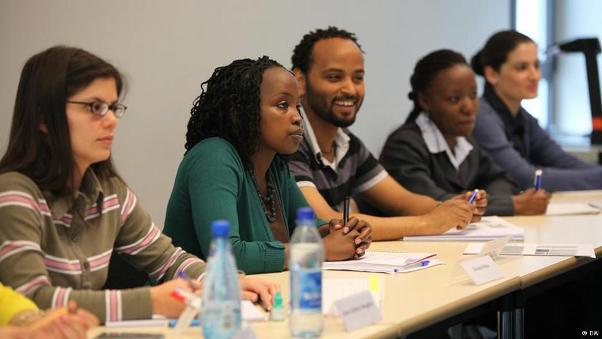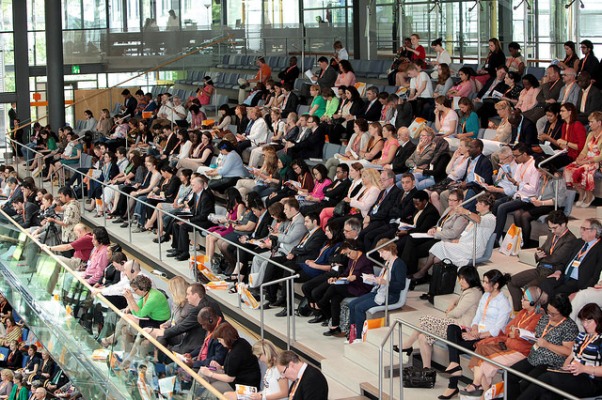Search Results for Tag: media training
DW shows the world why ‘climate action needs media freedom’
At the COP23 in Bonn, DW raised awareness of the important role of media in informing the public about the complicated issues surrounding climate change. During the UN climate conference, DW Akademie held multiple workshops organized around the motto “climate action needs media freedom.”
During the conference dozens of journalists were invited to Bonn to connect with climate activists and other journalists from around the world to share ideas and expertise. Participants learned about how to report on climate change issues and increase coverage in affected regions.
DW Akademie emphasized how the media provides an essential platform for dialogue in finding sustainable solutions to social problems caused by climate change.
Ten journalists from pacific islands were trained by DW Akademie in advance of COP 23 to report on the conference for media outlets at home. Another multimedia training brought 13 journalists from the Fiji-Islands, Papa-New Guinea, Samoa and other pacific states to Bonn for an exchange of expertise on climate change reporting. Other workshops brought journalists from Somaliland, Myanmar Sudan, Namibia and Jordan.
DW also launched a multimedia project called Kids4climate, which is intended to raise awareness of climate issues among children. It works by providing examples of activities that kids have initiated such as planting trees or organizing a “ride your bike to school” day. The videos also feature activities that kids and families can do together.
And on the sidelines of COP23, DW brought together the mayors of Pretoria in South Africa and Pittsburgh, Pennsylvania in the USA for a radio discussion broadcast on DW’s World in Progress. They spoke about similarities between their two cities in looking toward the future and shed light on how climate change is a problem that unites cities around the world.
The discussion provided an example of how the media can provide a platform for public officials to openly exchange ideas on how to make their communities more sustainable.
DW Akademie orients students in a changing global media landscape
DW represents Germany in the international media landscape, and besides providing audiences worldwide with quality journalism, DW Akademie also promotes media development with training programs for media professionals. The International Media Studies master’s program from the DW Akademie is a comprehensive part of DW’s role in fostering high standards in media. The IMS program is currently accepting applications.
Every year the program accepts 30 students from around the world. The IMS curriculum reflects the diverse career paths open to media professionals. But the benefits of the IMS program are best exemplified by what graduates go on to accomplish. Just a few careers of recent graduates include a university professor in Brazil, a senior public affairs consultant in Indonesia and a project coordinator for media development in Belarus.
Two IMS graduates also created the blog Multicoolty, which started off exploring what life is like in Germany for those coming from other cultures, and has since expanded this focus to include France, Italy and Russia.
IMS also produces a series of research books, “Edition International Media Studies”, which take an in-depth look at issues affecting different media systems around the world. The 2015 edition focuses on international standards of journalism education. Previous editions include analysis of media landscapes in Kenya and Pakistan and the role of the media in the Arab world.
With each new IMS class, a range of cultures and professional backgrounds come together to create a unqiue learning environment. Prospective IMS students have until March 31 to apply.
How to bring together theory and expertise to train international journalists
Many journalism degree programs can miss providing students with a clear set of skills to be effective in the workforce. Many universities, especially in developing nations, lack the technical resources to provide students with these skills, leaving that part of their education to internships, which are not always structured or guarantee that the student will acquire practical expertise.
Journalism does not exist in a vacuum. It’s essential that journalists, especially those working in international contexts, understand the different social, political and economic frameworks in which events play out – but an educated mind requires educated hands.
DW Akademie, in cooperation with universities in Bonn, puts the resources of a world-class broadcaster in the hands of students. Those who earn a place in the International Media Studies (IMS) Master of Arts program receive a one-of-a-kind educational opportunity, combining the professional competence of DW with the high academic standard at the University of Bonn and the Bonn Rhein-Sieg University of Applied Sciences.
IMS takes a theoretical approach and backs it up with practical experience leaving graduates with a cohesive skill set that will enable them to know what they are doing and why. The curriculum includes everything from media systems and media management to globalization and development studies – all combined with hands-on projects.
The students are another important part of what makes IMS special: They come from all over the world. IMS is aimed at aspiring media professionals from developing countries who will be able to put their education to work where it is needed most.
The wide-range of master’s theses attest to the diversity of each IMS class. Two recent graduates produce Multicoolty, an entertaining blog that profiles life in Germany from the perspective of foreigners. Another group of students worked on a research project examining press coverage of Egypt. Intriguing research on international media is also published in the context of IMS.
IMS is currently accepting applications for the upcoming class. Important information from the program requirements to costs and logistics can be found in the FAQ. If you are interested in becoming an IMS student, don’t miss this unique opportunity. Prospective students have until March 31, 2015 to apply.
Open a door to your future with DW
DW Akademie is staying ahead of the learning curve and has designed a new trainee program that opens a door of opportunity for a talented group of young and international media professionals. DW’s new international traineeship uses a multilingual and multimedia-oriented approach with televison, radio and online, providing graduates with the skills they need to succeed in today’s global media landscape.
Admission is competitive and if selected, you will be part of a distinctive learning community among international colleagues who will share your passion for media and world-class training in journalism. You will also be exposed to a broad spectrum of disciplines and professional backgrounds while expanding your horizons in a stimulating, internationally diverse atmosphere.
A traineeship with DW is also about being active and putting practice first. Trainees have the resources of Germany’s international broadcaster at their fingertips and will get the opportunity to work with DW’s editorial departments in Bonn and Berlin as well as internships abroad with DW’s foreign bureaus in Moscow, Brussels or Washington D.C.
This year 12 candidates will be accepted into the 18-month program. Think you have what it takes? Applications are now being accepted and the deadline is October 31. You can also put yourself to the test right now and try out the general knowledge quiz used for candidates in 2013.
Journalisitc expertise has helped define the Global Media Forum
An important part of DW’s mission is sharing its 60 years of journalistic and media experience with the world. DW has organized a number of events at the 2014 Global Media Forum in cooperation with organizations and partners which represent the high level of expertise at Germany’s international broadcaster.
Complementing the focus of this year’s conference is a panel organized by the DW Akademie that explores the state of participatory and community-based media in developing countries. The session titled, The power of the neighborhood: How local media organize participation and how DW Akademie supports this, showcases three projects that foster grassroots journalism from partner organizations that span the globe – Welad Elbalad Media Services from Egypt, Open Development Cambodia and Plataforma de Periodismo from Colombia.
With a focus on the watchdog role of journalism is a session titled Whistleblowers, activists, journalists: Is advocacy journalism the journalism of the digital age? The panel includes an editor from Zeit Online and a professor of entrepreneurship and media literacy from the Walter Cronkite School of Journalism and Mass Communication at Arizona State University. The emphasis is on how digital media allows journalists to shed their neutrality and take an active stance on social issues.
Those interested in the EU and public participation should look at a session titled, Turning disinterest into engagement through innovative media formats. Hosted by DW in cooperation with the Institute for Foreign Cultural Relations (ifa), the discussion explores innovations in social media and journalism that are combining to increase citizen engagement in social issues, particularly with the context of EU policy and elections.
At the intersection of social media and human rights is a talk hosted by DW titled, Revolution postponed. The Arab Spring and Africa The discussion brings together African social media experts and journalists to analyze the state of social movements all over Africa, whether it is the Arab Spring in the north to political protests everywhere from Angola to Zimbabwe. The panel will explore if the movements have lost momentum and what the future may look like.













Feedback